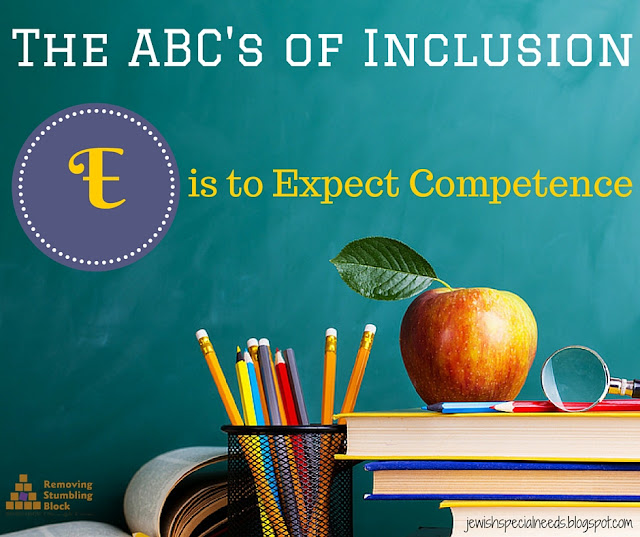Maybe
this seems a little familiar to you. Maybe you recognize a variation of this
phrase. That wouldn’t surprise me. The phrase “presume competence” has been
around the education world in relation to disability inclusion for quite some
time.
The most
succinct definition of this concept comes from Douglas
Biklen, Dean of the School of Education at Syracuse University. Biklen is
also faculty in Disability Studies, and the Senior Researcher at the
Institute on Communication and Inclusion. Biklen explains that, “to presume
competence is to assume that a child has intellectual ability…and assume the
child wants to learn and assert him or herself in the world. To not
presume competence is to assume that some individuals cannot learn, develop, or
participate in the world. Presuming competence is…a framework that says:
approach each child as wanting to be fully included, wanting acceptance and
appreciation, wanting to learn, wanting to be heard, wanting to contribute.”
And while
I agree wholeheartedly with Biklen’s definition, I think we need to take this a
step further. I think we must go further than assuming a person has
intellectual ability – after all, you know what they say about assuming…
I
believe that we need to EXPECT COMPETENCE.
Now
here’s the thing. I’m a grammar nerd. I LOVE WORDS. I genuinely like to dig
into the meanings and subtle differences in understanding that can be created
based on word choice. And I like to tease apart the subtle differences in semantics.
My issue:
I don’t think the phrase “presume competence” is strong enough. I think that
too many people confuse or even conflate (combine two or more texts, ideas,
etc. into one) the words assume and presume. I believe that too many people
actually miss the layer of expectation inherent in presuming.
Assume -
to take as granted or true
Presume -
to expect with confidence; to suppose to be true without proof
Something distinct happens when we have an expectation rather than simply assuming something will happen. It is for
this reason that I chose to be overt in my word choice for this series (that;
and I really like my choice of “P is to Prepare”).
I think an example or two can help to make this clearer.
Here’s
one:
If I assume
that my class of fifteen four-year-olds can all learn, I will likely
approach each day with a positive attitude and a desire for creating exciting,
dynamic and meaningful learning experiences. Sounds terrific, right?
But when
I EXPECT that each of those fifteen four-year-olds will learn; I
change the game. I will work toward creating the exciting, dynamic and meaningful
learning experiences that will bring out the best in each of those students.
Another
example:
 If I assume
that all of my sixth graders can learn the prayers of the Torah
service, I will expose them to appropriate and meaningful materials and
learning experiences that will help them to achieve that goal.
If I assume
that all of my sixth graders can learn the prayers of the Torah
service, I will expose them to appropriate and meaningful materials and
learning experiences that will help them to achieve that goal.
But when I
EXPECT that each of those sixth graders will learn the prayers of the Torah
service, I will accept nothing less – and I'll work to find
the ways to excite, support and guide each of them to reach their full potential.
I suppose
that you could argue that I’m splitting hairs. But I don’t think so. I think
that our beliefs and interactions with one another shift when we EXPECT
competence. It's active rather than passive, and I think that might just be the key. There are, sadly, plenty of educators and professionals who
assume that students, particularly those with complex or highly involved
disabilities, can’t learn. Or that they can’t learn more. Or that they
know best what a student should learn and therefore limit exposure to curriculum in some way. This is so very unfortunate.
When we have
expectations – for our students and for ourselves – we do the best that we can
to meet them. Everyone wins.
Biklen
concludes, “By presuming competence, [by expecting competence] educators
place the burden on themselves to come up with ever more creative, innovative ways
for individuals to learn. The question is no longer who can be included
or who can learn, but how can we achieve inclusive education.”
Yes. This. Absolutely this.
Subscribe to Removing the Stumbling Block so you never miss a post:

No comments:
Post a Comment